Seminario Latinoamericano de Filosofía Política (2023)
Seminario Latinoamericano
de Filosofía Política
Entidades convocantes
Red Reino Unido-Latinoamérica de Filosofía Política • Instituto de Investigaciones Filosóficas, UNAM • Instituto Ezequiel de Olaso (CIF/Conicet) • Universidad del Bosque, Colombia • Instituto de Investigaciones Dr. José María Luis Mora • University College London, Reino Unido
Coordinan: Dr. Moisés Vaca
Dr. Julio Montero
PROGRAMA 2023
Registro previo: uklanpp@gmail.com 
Se dará constancia de asistencia
Sesión 1
Viernes 3 de marzo, 2023 | 10 hrs. CDMX
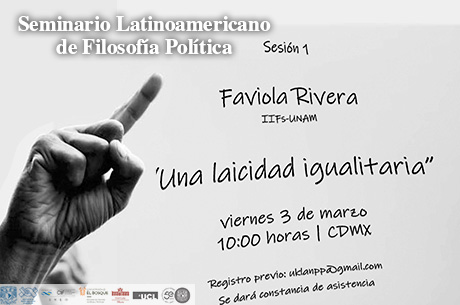 Dra. Faviola Rivera
Dra. Faviola Rivera
IIFs - UNAM
“ Una laicidad igualitaria ”
Sesión 2
Viernes 21 de abril, 2023 | 10 hrs. CDMX
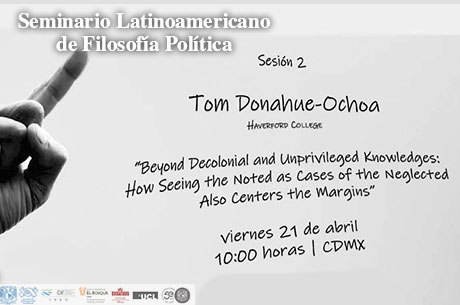 Tom Donahue-Ochoa
Tom Donahue-Ochoa
Haverford College
“ Beyond Decolonial and Unprivileged Knowledges: How Seeing the Noted as Cases of the Neglected Also Centers the Margins ”
Sesión 3
Miércoles 14 de junio, 2023 | 10 hrs. CDMX
Sesión híbrida - Sala de Seminarios Fernando Salmerón - IIFs
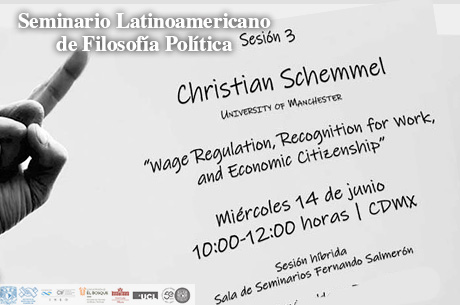 Christian Schemmel
Christian Schemmel
University of Manchester
" Wage Regulation, Recognition for Work, and Economic Citizenship "
ABSTRACT:
Most of us work for a wage. We do so because we need the money to fulfil our needs and preferences. But many of us also believe that wages express something about the value of our work, to our employers or customers, or to society in general. But what? What wages express matters greatly for how they have to be regulated.
Recognition theory is a suitable normative framework for seeking to make sense of the social meaning of wages. According to standard recognition theory, (differential) wages express (differential) esteem for our (different) social contributions. But this proposal fails to make sense of what is at stake in wage regulation, specifically. This can be shown with the important example of minimum wage guarantees.
What is at stake instead in wage regulation is a basic form of contributor respect, which is the appropriate response to workers fulfilling their obligation to contribute to social cooperation. Paid work is one prominent (but not the only) way to fulfil this obligation. Contributor respect, in turn, points to an idea of economic citizenship – a status, understood as a bundle of rights and duties, of a full participant in economic cooperation. This idea of economic citizenship has many different implications for wage regulation, and policies affecting the remuneration of work, more broadly: for democratic wage-setting procedures; for how to respond to ways of fulfilling one’s obligation to contribute other than formal employment; for taxing work justly compared to other sources of income; and for whether we should institute unconditional resource schemes to break the link between contributor respect and wages.
Sesión 4
Jueves 24 de agosto, 2023 | 10:30 hrs. CDMX
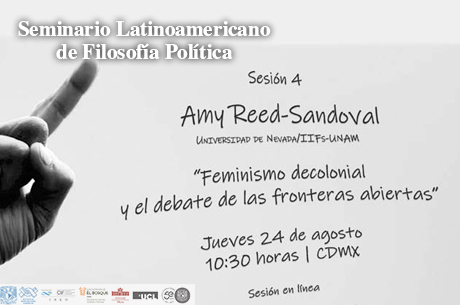 Amy Reed-Sandoval
Amy Reed-Sandoval
Universidad de Nevada/IIFs-UNAM
"Feminismo decolonial y el debate de las fronteras abiertas"
Registro previo:uklanpp@gmail.com 
Se dará constancia de asistencia
Sesión 5
Viernes 29 de septiembre, 2023 | 12:00 hrs. CDMX
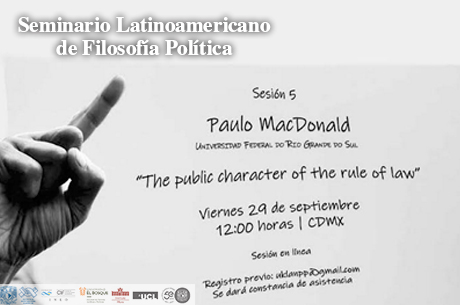 Paulo MacDonald
Paulo MacDonald
Universidad Federal do Rio Grande do Sul
"The public character of the rule of law"
Registro previo:uklanpp@gmail.com 
Se dará constancia de asistencia
Sesión 6
Viernes 3 de noviembre, 2023 | 10:00 hrs. CDMX
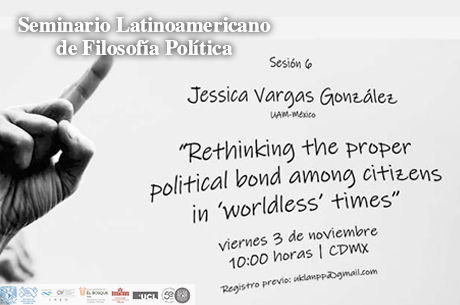 Jessica Vargas González
Jessica Vargas González
UAM - México
"Rethinking the proper political bond among citizens in ‘worldless’ times"
Registro previo:uklanpp@gmail.com 
Se dará constancia de asistencia
Aviso de privacidad




 Circuito Maestro Mario de la Cueva s/n, Ciudad Universitaria, C.P. 04510, Coyoacán México, CDMX
Circuito Maestro Mario de la Cueva s/n, Ciudad Universitaria, C.P. 04510, Coyoacán México, CDMX